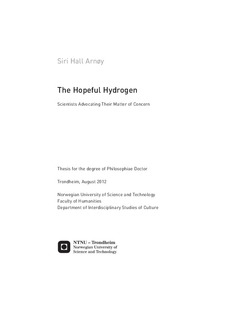| dc.description.abstract | In this thesis, I look at Norwegian hydrogen scientists and their interaction with policy and politics, asking the question of whether scientists have taken part in the making of policy for hydrogen as an energy carrier. Hydrogen has been suggested for various roles in the energy system, from dominating force in a new energy regime (the Hydrogen Society) to one of several potential low-emission fuels for transportation. Hydrogen has to varying degrees been connected to renewable energy, fossil fuels and nuclear energy (the latter has been seen internationally, but has not been an issue for policy in Norway). At the same time, hydrogen as an energy carrier represents a set of technologies that need to work together, and while production, use and storage of hydrogen is currently doable, it is not yet commercially viable without government support. Furthermore, hydrogen faces a set of issues related to infrastructure – hydrogen energy may be an option, but it requires allies to become reality.
Theoretically, I employ literature on scientists as advisors to policymakers, on interdisciplinarity, and on the proposed turn towards an increased focus on relevance (as shown in e.g. the concept of ‘Mode 2' science). I show how hydrogen science is a result of a co-production of diverse scientific efforts and an amalgamation of political issues, and I use translation theory to see how the scientists attempt to gain support for hydrogen science and promote understanding for hydrogen as a broader energy issue. Finally, I argue that while these various STS approaches are useful to illuminate my case, we need to pay as close attention to the role of policymakers as we do to the role of scientists when examining their interaction.
The empirical basis of the thesis is a combination of field work (which has served as a basis for finding interviewees and documents), interviews and document studies. In the first paper, Adaptable scientists? Features of interdisciplinary research, I use interviews with the hydrogen scientists to examine hydrogen science as a field. Embarking from a definition of hydrogen scientists as scientists who somehow – through e.g. writing research papers or newspaper feature articles or attending conferences – have connected their research to hydrogen as an energy carrier, the paper employs different theories on interdisciplinarity to simultaneously explore if interdisciplinarity is indeed a fitting label for hydrogen science, and what it means for the hydrogen scientists to be involved in an interdisciplinary field. I show how being engaged with hydrogen has an observable effect on research agendas, and how the scientists simultaneously connect hydrogen to a personal sense of meaning and achieving societal relevance. The second paper, The Rise and Fall of ‘Hydrogen Society': Scientific advice and policy learning, shows how ‘hydrogen society' made its way into Norwegian energy policy discourses, and how it after first receiving significant political attention, lost prominence. The policy discourses are mainly observed through a document study, while a combination of documents and interviews are used to illuminate the role of scientific advice in the process. The paper shows how hydrogen first was connected to a set of issues like industry policy, domestic use of natural gas, and renewable energy, and how it then seemingly become mainly a technology for environmentally friendly transportation. Finally, in the third paper, Advising or advocating? Funding applications as policy advice, I look at funding applications submitted to the Research Council of Norway, looking at the ways in which the relevance of science is argued through them, and suggesting that they represent a channel for scientists interacting with policymakers and are a fruitful place of study to look at scientists as policy advisors. | nb_NO |
